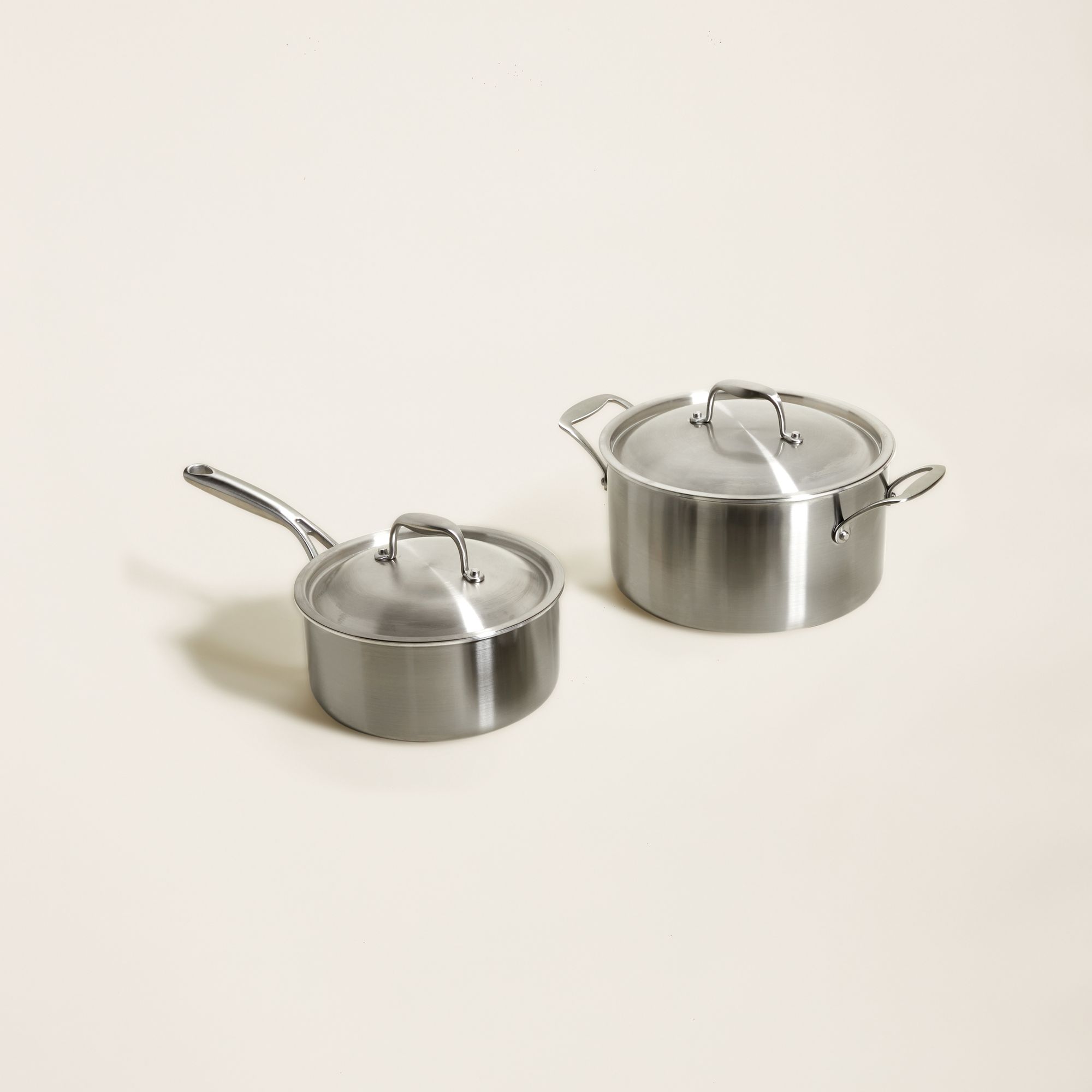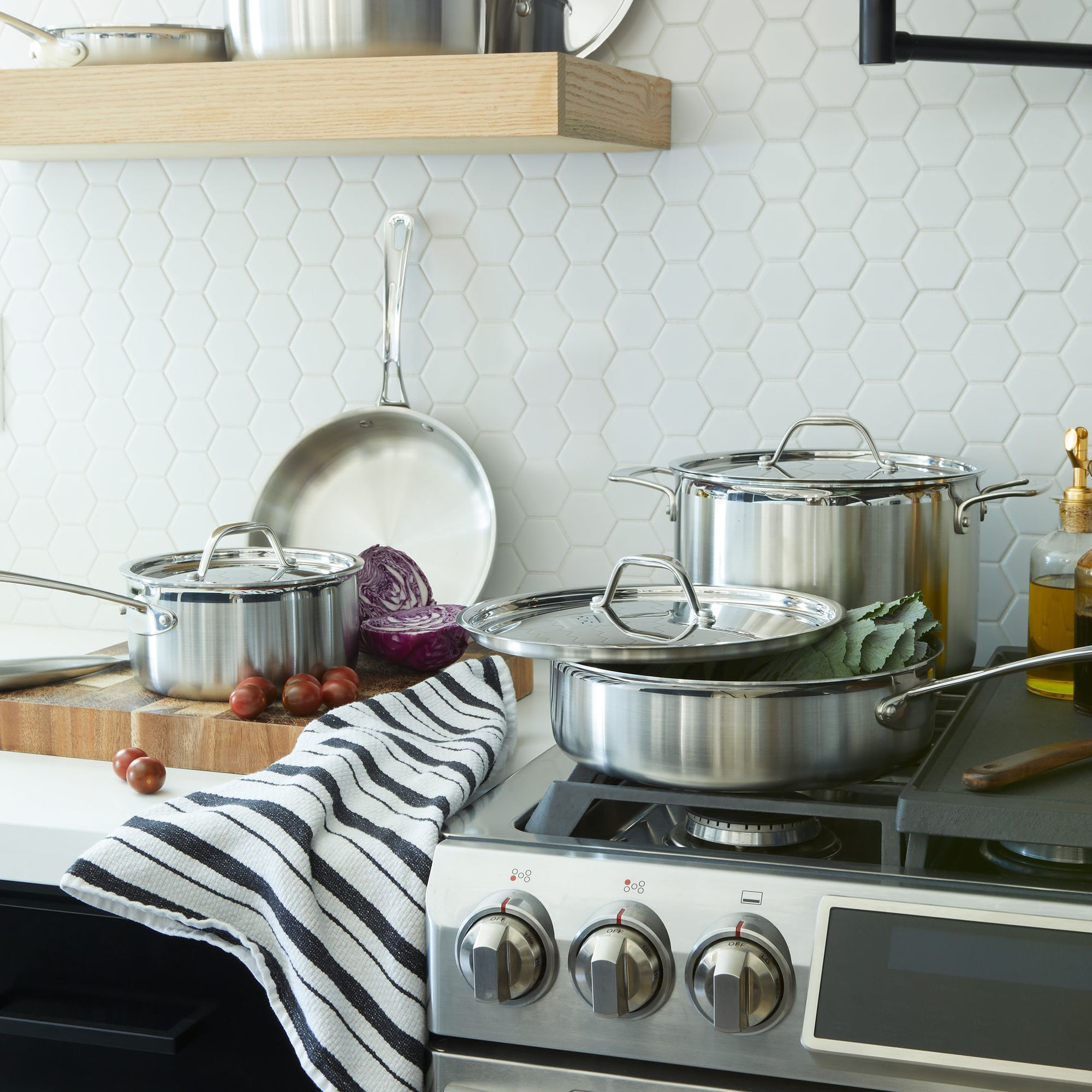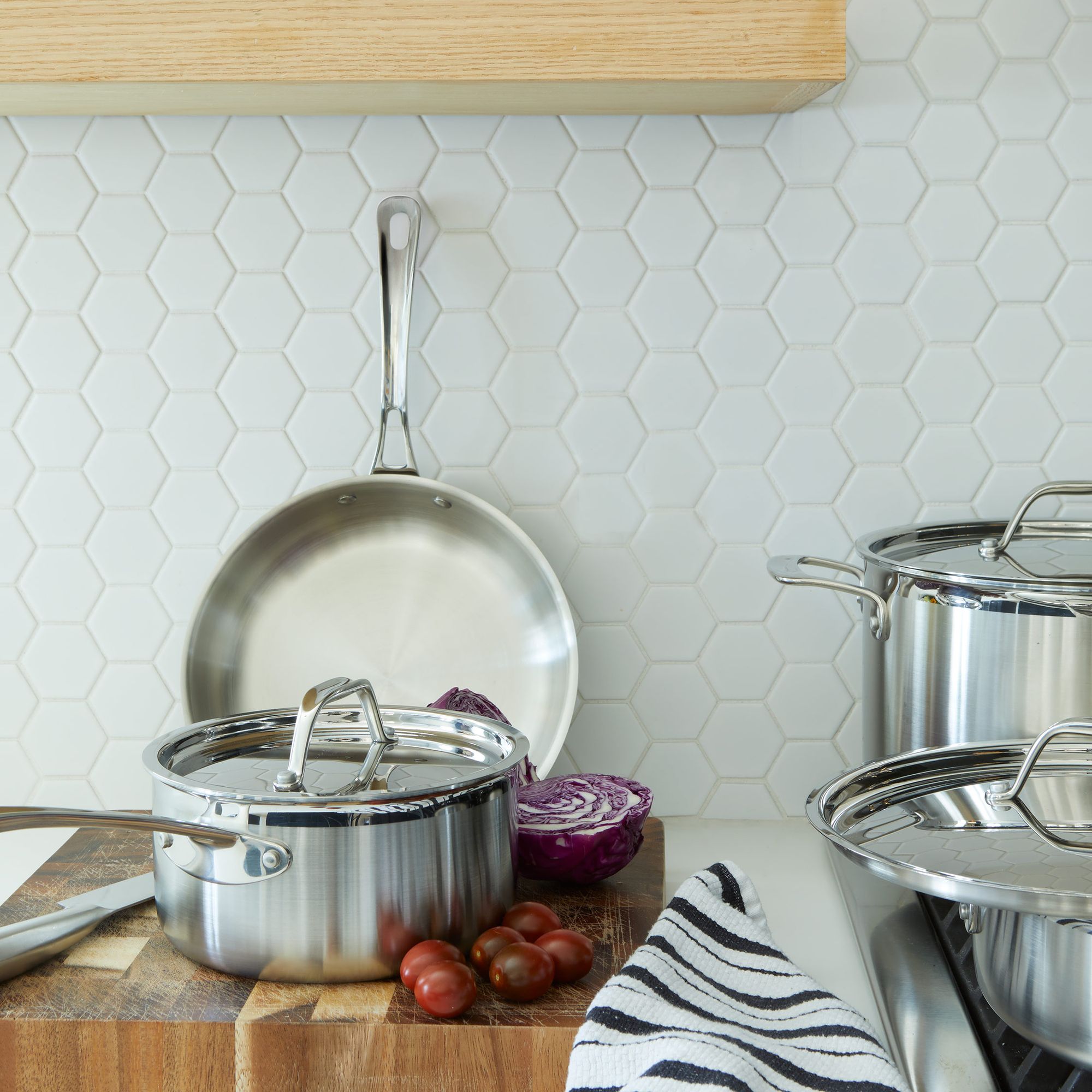Choosing the right cookware is just as important as selecting the freshest ingredients for your dishes. The cookware you use in your kitchen plays a crucial role in your overall culinary experience.
In this article, we’ll share with you why choosing good cookware is essential and what to look for when selecting the perfect pots and pans for your kitchen.
1. Non-stick
Non-stick cookware is a type of cookware that has a special coating on the cooking surface that prevents food from sticking. This coating is usually made of a material called polytetrafluoroethylene (PTFE), aka Teflon.
Non-stick cookware makes cooking a breeze because you don't have to worry about your food sticking to the pan, and it also makes cleaning up afterward a lot easier.
What are the benefits of using non-stick cookware?
- Easy to clean because the non-stick coating prevents food from sticking to the surface
- Requires less oil or butter for cooking, which can make your fish dishes healthier and lower in calories
- Distributes heat evenly, which can help ensure that your fish is cooked all throughout and prevent hot spots that can lead to overcooked or undercooked areas
- Versatile and can be used for a variety of dishes, such as sautéing or frying.
What are the disadvantages of non-stick cookware?
- Less durable than other types of cookware because its coating can wear off over time, especially if it's scratched or exposed to high heat
- Acidic ingredients don’t do well in non-stick cookware and can break down its coating faster
- Can release harmful chemicals into the air or food when heated higher than 260°C
- A scratched or damaged pan releases harmful chemicals
Frequently Asked Questions
Q: When should you throw away non-stick pans?
A: It's a good idea to replace your pans about every five years or so. It's important to keep an eye on them and check for signs of wear and tear. If you notice that they're starting to look warped, discolored, or scratched, it's time to retire them and get some new ones.
Q: Can I use oil in a non-stick pan?
A: Yes! In fact, you don't even need to cover the whole pan with oil. Just a small amount is enough to create a barrier between the food and the surface.
Q: Do you wash non-stick pans?
A: Normally, all you need is a quick scrub with some mild dish soap and a soft cloth or sponge to get the job done. But if you come across some stubborn residue that won't budge, you might need to give it a good soak in warm, soapy water for a few hours before gently scrubbing it clean. Just be careful not to use any harsh abrasives or metal utensils that could damage the non-stick surface.
Our pick: All Clad Essentials Nonstick Cookware Set
2. Stainless Steel Pan
A stainless steel pan is made from a blend of steel, chromium, and sometimes other metals. Stainless steel is known for its durability and non-reactivity with food making it a popular choice for cookware.
What are the benefits of using stainless steel cookware?
- Durable and can last for a long time with proper care.
- Resistant to corrosion, which means they won’t rust.
- Can perform at higher temperatures up to 500°C and distribute heat evenly.
- Non-reactive, which means they won't react with acidic ingredients such as lemon juice, vinegar, or tomato
- Llighter compared to most cookware, so it’s easier to maneuver
- Easy to clean and maintain. They can be washed in the dishwasher or by hand with a mild detergent and sponge.
- Don't require seasoning like cast iron cookware, making them more convenient to use but, some people (especially chefs!) choose to.
What are the disadvantages of stainless steel cookware?
- Stainless steel cookware is not naturally non-stick and can be more prone to food sticking to the surface. You’ll need more butter or oil when cooking. Alternatively, you can also season it for ease of use.
- You don’t need to be a pro to work a stainless steel pan, but it does have a learning curve in order to encounter less sticking.
Frequently Asked Questions
Q: Is stainless steel cookware non-stick?
A: No, stainless steel cookware is not non-stick. However, it can be seasoned or have a non-stick coating added to the cooking surface.
Q: Why do chefs prefer stainless steel pans?
A: Well, it's because it's practically indestructible! Not only that, but the construction and material also provide superior heat distribution, which means your food will cook more evenly. With proper use, a stainless steel pan can even prevent food from sticking, making it a reliable and versatile option for any kitchen.
Q: Is stainless steel cookware dishwasher safe?
A: Most stainless steel cookware is dishwasher safe, but it's always a good idea to check the manufacturer's instructions before putting it in the dishwasher.
Our pick: Temper Stainless Steel 5-Ply Cookware Essential Duo

3. Cast Iron Pan
Cast iron is a popular type of cookware that's been around for centuries, and for good reason! Cast iron cookware is made by pouring molten iron into a mold and then letting it cool and harden. This process creates a durable, long-lasting, and heavy-duty piece of cookware that can withstand high temperatures and last for generations.
What are the benefits of using cast iron cookware?
- Can last for generations. They are durable and versatile cookware that can be used for all stove tops, ovens, and grills.
- Can withstand heat of up to 800°C, which is hotter than most ovens can go. Even when you reach that temperature, it remains non-toxic.
- Over time, cast iron cookware develops a film that can make it easier to cook food without it sticking to the surface.
- Cast iron pans retain heat longer than other cookware.
What are the disadvantages of cast iron cookware?
- Generally heavier than other types of cookware, which can make them more difficult to handle and maneuver.
- Can take longer to heat up compared to other types of cookware, such as stainless steel or aluminum, but once it’s hot it retains heat very well.
- Can be reactive with acidic ingredients and affect the taste and texture of fish dishes. If you’re someone that’s particular with this, best to use your stainless pan for acidic dishes.
- Needs extra care to keep its non-stick film. They require regular seasoning to maintain their nonstick surface and prevent rust.
Frequently Asked Questions
Q: Is cast iron cookware non-stick?
A: Cast iron cookware can be non-stick if it's seasoned properly. Seasoning involves coating the cooking surface with oil and heating it to create a natural non-stick coating.
Q: How do you clean and maintain cast iron cookware?
A: To clean cast iron cookware, rinse it with hot water and use a stiff brush or sponge to remove any food residue. Avoid using soap, as it can strip away the seasoning. Dry the cookware thoroughly and apply a thin layer of oil to the cooking surface to maintain the non-stick coating and prevent rusting.
Q: Is it OK to cook in cast iron everyday?
A: Yes, cast iron is completely safe and ok to use everyday.
Our pick: Blackstone Cast Iron Dutch Oven
4. Ceramic Cookware
Ceramic Cookware is made of a clay base that's covered with a ceramic glaze. This coating is what gives ceramic cookware its unique properties, including its non-stick surface and attractive appearance. One of the great things about ceramic cookware is that it's completely free of PFOA and PTFE.
What are the benefits of using ceramic cookware?
- Generally safe and non-toxic.
- Easy to clean and usually dishwasher safe. Unlike other non-stick coatings, ceramic coatings do not deteriorate or break down over time, so they can last longer.
- Suitable for use on most types of stovetops, including gas, electric, and ceramic cooktops. Some types of ceramic cookware can also be used in the oven, making it a versatile choice for cooking a wide range of dishes.
What are the disadvantages of ceramic cookware?
- More fragile than other types of cookware, such as stainless steel or cast iron. If dropped or exposed to sudden temperature changes, it can crack or chip, which can affect its cooking performance and safety.
- May not be suitable for high-heat cooking, as it can break or crack under high temperatures. This means that it may not be the best choice for searing meats or cooking stir-fries at high heat.
- Not suitable for use on induction cooktops.
Frequently Asked Questions
Q: Is ceramic cookware safe to use?
A: Yes, ceramic cookware is safe to use. It's made from natural materials and is free of harmful chemicals like PFOA and PTFE.
Q: Is ceramic cookware non-stick?
A: Ceramic cookware can be non-stick if it's coated with a non-stick material. However, the non-stick coating can wear off over time and may need to be reapplied or replaced.
Q: How long does ceramic cookware last?
A: The lifespan of ceramic cookware depends on factors like the quality of the materials and how well it's cared for. With proper use and maintenance, ceramic cookware can last for several years.
Our pick: GreenPan SearSmart Ceramic Nonstick Cookware Set
5. Aluminum Cookware
Aluminum cookware is a type of cookware that is made from aluminum metal. It is a popular choice because it is lightweight, conducts heat well, and is relatively inexpensive compared to other types of cookware.
What are the benefits of using aluminum cookware?
- An excellent conductor of heat, which means that it heats up quickly and evenly, making it ideal for cooking a wide range of dishes.
- Lightweight, which makes it easy to maneuver in the kitchen.
- Relatively inexpensive, making it a great choice for home cooks who are on a budget.
- Easy to clean and maintain. It is also resistant to rust and corrosion, so it can last for many years with proper care.
What are the disadvantages of aluminum cookware?
- Can react with certain acidic or alkaline foods, such as tomatoes or vinegar. To avoid this, it is recommended to use anodized aluminum cookware or to use a non-reactive coating, such as stainless steel or enamel, on the surface of the aluminum cookware.
- Not as durable as other materials, such as cast iron or stainless steel. It can dent or scratch easily, which can affect its cooking performance and longevity.
Frequently Asked Questions
Q: Can aluminum cookware be used on an induction cooktop?
A: Majority of aluminum cookware is not compatible with induction cooktops because it's not magnetic.
Q: Can acidic foods be cooked in aluminum cookware?
A: It's generally not recommended to cook acidic foods in aluminum cookware because the acid can react with the metal and cause a metallic taste in the food.
Our pick: Member’s Mark (Sam’s Club) Hard Anodized Aluminum Cookware
6. Copper Cookware
Copper cookware is a type of cookware that is made primarily from copper metal. Copper is an excellent conductor of heat, which makes it ideal for cookware as it allows for even heating and precise temperature control.
What are the benefits of using copper cookware?
- One of the best materials for conducting heat, which means that it heats up quickly and evenly.
- Highly durable and resistant to corrosion and wear.
- Known for its distinctive, elegant appearance, which can add a touch of style and sophistication to any kitchen.
What are the disadvantages of aluminum cookware?
- Can react with acidic foods
- More expensive compared to other types of cookware, which may be a consideration for some home cooks.
- Requires special care to maintain its appearance and performance. It should be hand-washed and dried immediately after use to prevent tarnishing, and it should be polished regularly to maintain its shine.
Frequently Asked Questions
Q: How do I clean copper cookware?
A: To clean copper cookware, use a mixture of salt and vinegar or lemon juice to remove tarnish and discoloration. Do not use abrasive cleaners or steel wool as they can scratch the surface of the copper.
Q: How often do I need to re-tin my copper cookware?
A: If your copper cookware has a tin lining, it will need to be re-tinned periodically to maintain its non-reactive properties. The frequency of re-tinning will depend on how often the cookware is used, but it is generally recommended to re-tin every 5-10 years.
Q: Why is copper cookware expensive?
A: Copper cookware can be quite expensive due to its high conductivity and durability. However, there are different grades of copper cookware available at varying price points.
Our pick: Mauviel Copper Triply M'3 S 7-Piece Cookware Set
7. Carbon Steel Cookware
Carbon steel cookware is a type of cookware that's gaining popularity among professional chefs and home cooks alike. Carbon steel cookware is made from a combination of iron and carbon, and it has a number of unique properties that make it a great choice for cooking.
What are the benefits of using carbon steel cookware?
- Responsive to heat
- Lightweight
- Can withstand temperatures of up to 700°C. You can sear, fry, sauté, and bake all in the same pan.
- Develops a natural non-stick surface that can make it easier to cook fish without it sticking to the surface.
- Durable and can last for years with proper care. Carbon steel is 1% carbon and 99% iron, which is a highly durable and strong composite.
- Relatively affordable compared to stainless steel or cast iron cookware.
What are the disadvantages of aluminum cookware?
- A carbon steel pan is a serious pan for a serious cook. It is not for beginners as it requires a level of maintenance that might be overwhelming for some.
- Can react with acidic ingredients, such as lemon juice or vinegar. For these types of dishes, you’re still better off with a stainless steel pan
- Can look blotchy over time with frequent use.
Frequently Asked Questions
Q: Is carbon steel cookware non-stick?
A: Carbon steel cookware is not non-stick, but with proper seasoning and use, it can develop a natural non-stick surface over time.
Q: How do I season carbon steel cookware?
A: To season carbon steel cookware, coat it with a thin layer of oil and bake it in the oven at a high temperature. Repeat this process a few times to build up a non-stick layer.
Q: Can carbon steel cookware be used on all cooktops?
A: Yes, carbon steel cookware can be used on all types of cooktops, including gas, electric, and induction.
Our pick: Matfer Bourgeat Black Carbon Steel Fry Pan
A note from Italic.
In conclusion, choosing the right type of cookware is essential for achieving great results in the kitchen. Each type of cookware has its own set of benefits and drawbacks, and it's important to consider your cooking needs and preferences before making a purchase.


Overall, whether you're a professional chef or a home cook, investing in high-quality cookware can make a big difference in your cooking results. By understanding the pros and cons of each type of cookware and choosing the one that best fits your needs, you'll be able to cook delicious meals with ease and confidence.